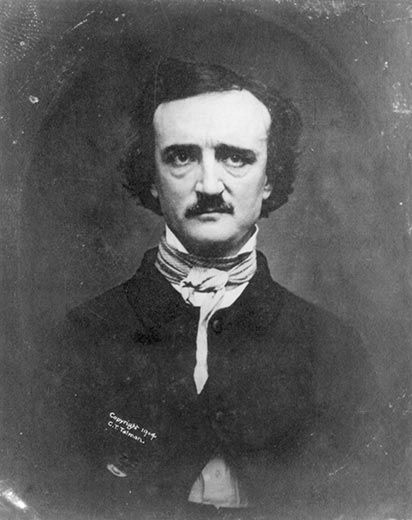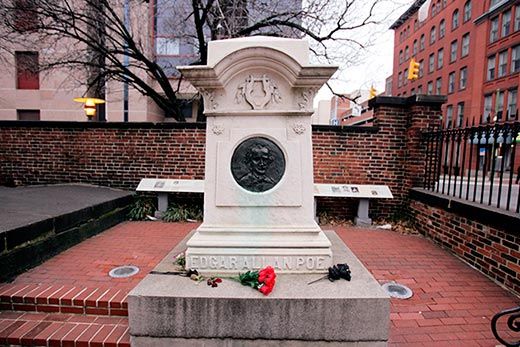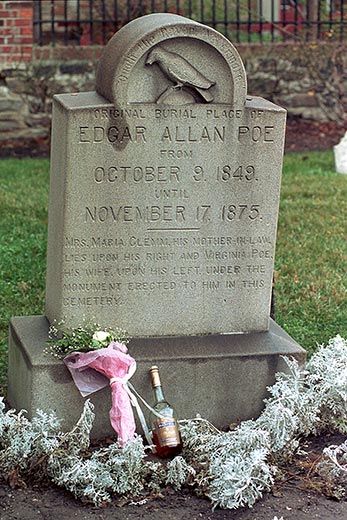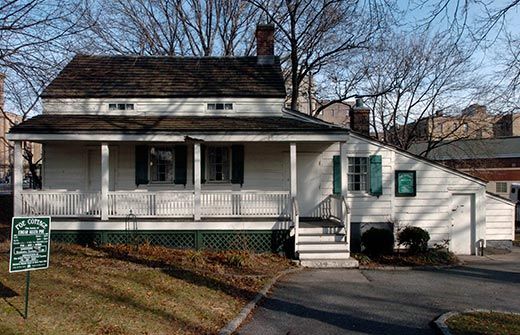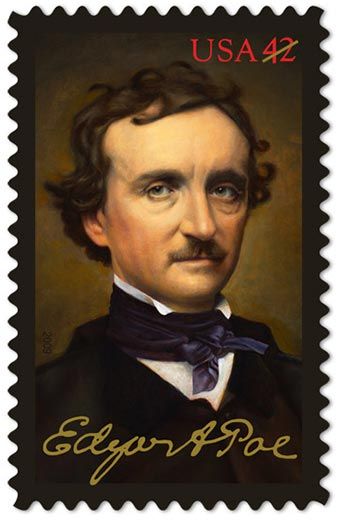Forget Edgar Allan Poe? Nevermore!
Cities up and down the East Coast claim author Edgar Allan Poe as their own and and celebrate his 200th birthday
/https://tf-cmsv2-smithsonianmag-media.s3.amazonaws.com/filer/Edgar-Allan-Poe-gravesite-Baltimore-Maryland-631.jpg)
Dead writers’ birthdays can be festive affairs. To mark John Milton’s 400th last year, English departments far and wide staged marathon readings of “Paradise Lost,” with at least one scholar reciting all 10,565 lines from memory. Charles Dickens’ 200th is still three years away, but already his bicentennial Web site is up and running, complete with a glossary of Victorian terms (bluchers: leather half-boots; gibbet: a post for displaying the corpses of executed criminals) and a detailed explanation of cribbage, one of Dickens’ favorite card games.
Yet none of this compares with the hoopla surrounding Edgar Allan Poe, who turned the big 2-0-0 this year. The celebrations far surpass the usual anniversary books and commemorative stamps (in his stamp, by the way, Poe looks much rosier-cheeked than you might expect). Because the horror writer relocated many times in his short life, a slew of cities – namely Philadelphia, Richmond, Baltimore, Boston and New York - are deadlocked in their claim to his legacy; to prove their worthiness, some have launched yearlong celebrations of the eccentric and the macabre. There are candlelight vigils, catacomb re-enactments, “Mask of the Red Death” masquerades with cash bars (which Poe, famous for his benders but chronically short on cash, probably wouldn’t have appreciated) and scads of Unhappy Hours (which he might have liked very much). There are raffles of coffin-shaped cakes and “Cask of Amontillado” wine tastings (“For the love of God Montressor you must attend this event!” one advertisement read, riffing on a famous line from the buried-alive narrative). Poe poetry slams, Segway tours, scavenger hunts, life-size puppet shows, exhibits of 19th century dentistry (a nod to Poe’s “Berenice,” in which the narrator pulls out his beloved’s teeth) - the list goes on and on. Hotels in Baltimore are offering a variety of deluxe packages featuring “blood-red” bottles of wine and coupons for Ravens lager at the Annabel Lee Tavern.
Pity poor Tennyson. It’s his 200th, too, and the most exciting tribute he’s getting is a tea party.
The Poe pomp and circumstance began in January (his birthday is January 19), is scheduled to rage throughout the summer (“Raven”-themed sand sculpture contest, anyone?) and will climax, conveniently enough, right around Halloween: Poe passed away under suspicious circumstances on October 7 in Baltimore, at the age of 40.
Indeed, Baltimore’s event lineup, known as “Nevermore 2009,” constitutes perhaps the most spectacular Poe blowout of all. Even in more ordinary years, the city, home of the Ravens NFL franchise, is hopelessly devoted to Poe, who lived there briefly with his aunt and young cousin (whom he married when she was 13) while writing some early stories. At midnight every January 19, a mysterious gentleman known as the Poe Toaster lays three roses and a bottle of cognac on Poe’s original downtown grave. And it is there that “Nevermore 2009” will mournfully conclude with a mock funeral procession (featuring an antique hearse), an open coffin viewing and not one but two fake funeral services.
“I didn’t want to do a lecture on Poe’s dramatic use of the semicolon,” says Jeff Jerome, curator of Baltimore’s Poe House and Museum. “That’s what Richmond’s doing. That’s what Philadelphia’s doing. I didn’t want people bored to tears.”
However, some (Poe fans in Philadelphia, ahem) say that Baltimore was not always so enamored of the oddball author. Indeed, the city didn’t exactly roll out the red carpet when Poe expired there in 1849. He wasn’t residing in Baltimore at the time, merely passing through, and it’s still unclear how, precisely, he met his untimely end. Rabies, alcoholism and a brain tumor have all been blamed; it’s also been speculated that an inebriated Poe was rounded up, forced to vote repeatedly in a corrupt Baltimore election and then left for dead. At any rate, after an unexplained absence of several days he was found collapsed outside a tavern near the harbor, wearing a frayed straw hat. He wound up in a pauper’s grave.
Twenty years later, though, his stock as a writer was rising, and “Baltimore realized, ‘Hey, isn’t that guy buried in one of our cemeteries? Yes!’ ” says Edward Pettit of Philadelphia, who writes an “Ed and Edgar” blog and oversees many local Poe events. Poe was promptly moved to a more prominent spot in the cemetery; during relocation, his coffin (naturally) collapsed. (The gravediggers reported hearing something rattling around in his skull, which was later counted as evidence for the brain tumor theory.)
Only now is Baltimore giving Poe a proper funeral, and it’s coming “160 years too late,” Pettit says. Recently, he penned an incendiary article suggesting that Poe be re-re-interred in Philadelphia. Asked if he’d been speaking metaphorically, Pettit responded: “I only meant it as a metaphor because I know it would never happen. In a perfectly just world of literary history, he would be dug up and buried in Philadelphia. We have a perfect plot of land in front of the Poe House.”
Actually, there are a bunch of Poe Houses. That is part of the problem.
For Pettit, it’s a bittersweet detail that Poe – who also lived and wrote in Philadelphia for a time - was en route to Philly when he died and might just have easily given up the ghost there. Other cities also have legitimate claims to the corpse. Poe once tried to commit suicide by swallowing laudanum in Boston, says Paul Lewis, a Boston College Poe specialist who, along with Jerome and Pettit, participated earlier this year in a formal debate about where Poe’s body belongs. Boston is Poe’s birthplace - to mark his bicentennial, the city named a square in his honor. But Boston has enough famous writers, critics say, and besides, Poe frequently locked horns with the resident Transcendentalists.
New York’s claim is that Poe wrote some of his best work there; his relatives apparently considered moving his body to the city after he died. And finally, there’s Richmond, where Poe spent much of his youth.
But maybe the controversy is less about Poe’s actual body than his body of work. Unlike his more provincial New England contemporaries, who frequently grounded their fictions in particular geographies, and even actual towns, Poe tended to base his stories in vague, medieval-like settings. The true backdrop for his work was the terrain of the mind. This is why it’s easy for everyone to see their city, and themselves, reflected in his writing, and also why there are Poe bicentennial celebrations planned in places he likely never visited, like Romania. (Though a Poe party on vampire turf is something of a no-brainer, come to think.)
Likewise, Poe’s influence extends far beyond the horror genre. Stephen King and R. L. Stine are indebted to Poe, but so are Vladimir Nabokov and Michael Chabon. Alfred Hitchcock was a fan, but so is Sylvester Stallone, who has for years floated the idea of directing a Poe film (rumored leading men have included Robert Downey Jr. and Viggo Mortensen).
After the last Great Poe Debate, the crowd voted Philadelphia the rightful heir to Poe’s remains; there will likely be a rematch in Boston this December. Yet wherever we decide Poe’s body belongs, we probably won’t let him rest. He’s been buried for more than a century and a half, but, like the victim in the “Tell-Tale Heart,” doesn’t seem quite dead.
